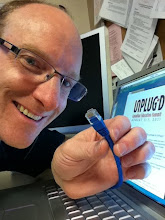In the past year, I've spent most of my time at school in supporting students who don't do homework; who are disengaged from school; who don't like to write; and who are too challenged with distractions of the day, to demonstrate an interest in lessons designed by their teachers.
This year, I've been more proactive in working with teachers to develop learning experiences that are more closely tailored to the interests and abilities of my clients. Here are a few examples of the work I'll be doing in coming days and weeks, that I hope will lead students to become active participants in their own learning.
Case 1: "I don't do writing..."
For a student who needs one more language credit, but who finds it painful to put pencil to paper, we're pursuing an independent project. In the next few weeks, I hope to scaffold the work of 'Trevor' who is designing a high school to meet the needs of unique students.
 Using Smart Ideas concept mapping software to scaffold the writing, 'Trevor' will be designing a whole new high school experience. This work grew out of a small writing assignment, and although it's been a struggle to get rolling, I've promised to share this student's work with a real world audience. If the project gains traction, you're likely to hear and see more about it in this space.
Using Smart Ideas concept mapping software to scaffold the writing, 'Trevor' will be designing a whole new high school experience. This work grew out of a small writing assignment, and although it's been a struggle to get rolling, I've promised to share this student's work with a real world audience. If the project gains traction, you're likely to hear and see more about it in this space.Case 2: "I can't sit in a desk..."
Like many teens, 'Jake' needs to be physically active in order to survive the school day. While our board's alternative education focuses on career skills and co-op, the remote site that hosts the program is inaccessible to this student. In order to develop a unique program to suit his needs, I'll be hosting a meeting of the special education department, the guidance department, the co-op department, and our school administration, to design a pilot learning experience that may one day be made available to other students at our school.
 The plan is to cluster a few accessible courses, and to design rich cross-curricular projects that will lead 'Jake' to demonstrate the achievement of the interdisciplinary course expectations. Ideally, we'll twin this project work with a co-op experience, and will provide access to multimedia tools and training so that 'Jake' can document his experience.
The plan is to cluster a few accessible courses, and to design rich cross-curricular projects that will lead 'Jake' to demonstrate the achievement of the interdisciplinary course expectations. Ideally, we'll twin this project work with a co-op experience, and will provide access to multimedia tools and training so that 'Jake' can document his experience. Case 3: "This class is a challenge..."
One of our grade 10 language classes has a disproportionate number of special needs students who chafe at the rigors of reading and writing. In completing the course and in preparating for the provincial literacy test, students are required to respond to a wide variety of 'media texts', so why not engage students in creating their own media texts?
 After consulting with the teacher and department head about movie-making and podcasting, we've settled on a few performance tasks that will allow students to play the roles of advertising executives, multimedia engineers, and movie-makers. What's more, students will have choice in the roles they'll play, and the best of their work will be seen by an online audience.
After consulting with the teacher and department head about movie-making and podcasting, we've settled on a few performance tasks that will allow students to play the roles of advertising executives, multimedia engineers, and movie-makers. What's more, students will have choice in the roles they'll play, and the best of their work will be seen by an online audience.While many of my Student Success colleagues around the province may find themselves working in triage, I'm trying to be proactive in helping teachers to create academic challenges that are compelling and relevant. I'm hopeful that my job will gradually become one of enriching the high school experience, rather than surviving it.
Photo credits: br1dotcom, vancouverfilmschool, Proctor Archives



